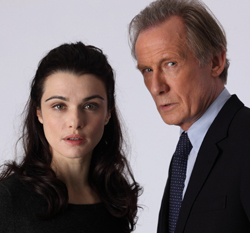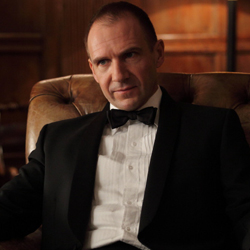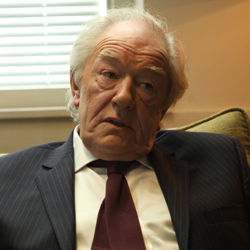
Counter-espionage was grander still, because it meant you had to be clever enough to anticipate and intercept the baddies. Only the best were invited to join that fraternity.
When well-bred, well-educated Johnny Worricker was recruited for MI5 by his college friend Benedict Baron, his job was counter-espionage. Now it’s called counter-terrorism. “There’s no difference,” Johnny tells a friend.
Oh, but there is.
Counter-terrorism is for bullies. There’s no finesse in it. And it’s the wave of the future. Spying is no longer a gentleman’s game.
Much of Page Eight, written and directed by playwright David Hare and presented on Masterpiece Contemporary this week, pines for the days of gentleman spies and old school ties.
The rest articulates a political statement that is neither fresh nor original (nor particularly astute), and that leaves me asking: What use is a crafty spy without a suitably crafty plot?
The title of the show refers to a sentence at the bottom of page eight in a classified document. It’s meant to be a particularly damning bit of intelligence, proof of something that might have been suspected but was never confirmed.
This revelation can be summarized in five simple words: Politicians act out of self-interest.
Gosh!
Now, prepare for another revelation: Governments lie.
Golly!
Oh, and, lest we forget: Americans are bad.
That last bit has become Hare’s trademark bugaboo. While his opinion might offend some American viewers, I figure Hare’s free to think what he wants. To me, his great transgression is couching his message in such a mundane story. For goodness sake, if you’re going to write about political intrigue, make it intriguing!
Johnny Worricker, played by Bill Nighy, is a spy in the Kim Philby/Anthony Blunt mold—a Cambridge man and an art collector—but without the royal connections or the tendency toward treason. He’s devoted himself to doing “dishonorable work in an honorable way” as an intelligence analyst with MI5.
Perpetually tight-lipped and clench-jawed, you can feel how he chafes in his thwarted desire to express his honest opinion. You’d think that someone who’s spent a lifetime in the spy game would be used to keeping himself to himself, but Johnny’s just the opposite. He’s aching to share.
Enter Rachel Weisz as Nancy Pierpan, Johnny’s neighbor and unlikely confidante. Her apparent guilelessness disarms him, although a part of him suspects her of having an ulterior motive. (She does, but it’s not very interesting.) Johnny reveals some of his thoughts to Nancy—enough to make him uneasy—and they form a bond that I choose to believe is platonic.

On a side note, I’m perplexed by the decision to film these actors and actresses in the most harsh, unforgiving light imaginable. Too often, I found myself transfixed by the crags and furrows on their faces. (Please! Show the fifty-something women some love!) That I contemplated this at length is a problem in itself.
I watched Page Eight twice to be sure I hadn’t overlooked some bit of brilliance, just as everyone in the story (except Johnny) overlooked that pivotal sentence on page eight of the document.
Nope.

Page Eight was touted as a spy thriller. Yet while there are plenty of spies here, it’s much too short on thrills.
Watch Page Eight on the PBS website. [ed. note: this show was part of Masterpiece Contemporary, not Masterpiece Mystery, but as it is crime-related and part of Masterpiece Theater, we’ve listed it under our Masterpiece Mystery feature anyway.]
Images courtesy of ©Carnival for Masterpiece
Leslie Gilbert Elman blogs intermittently at My Life in Laundry. She’s written two trivia books and has a few unpublished fiction manuscripts in the closet to keep the skeletons company. Follow her on Twitter @leslieelman.

I have this still in the DVR queue, lured in by the combined love for Gambon and Nighy, not to mention the husband has a thing for Rachel Weisz (wait–he likes pale-skinned women with dark hair? Go figure!).
I’ll still watch, but I’m glad for the warning about the less-than-thrill aspects.
Please do watch it and post your impressions. Rachel Weisz is appealing. Beware, your husband might develop a thing for Felicity Jones as well! Michael Gambon and Bill Nighy are great. Truly, the entire cast couldn’t be better, but I think they were squandered.
Leslie, you are so right. The story line was thin, tedious and “unthrilling” yet the performances were masterful–especially Gambon. I had to laugh when you wrote: “I watched Page Eight twice to be sure I hadn’t overlooked some bit of brilliance.” I only watched it once. You should get hazard pay for the second viewing. Terrie
It wasn’t exactly a hardship. 🙂 Thanks Terrie.